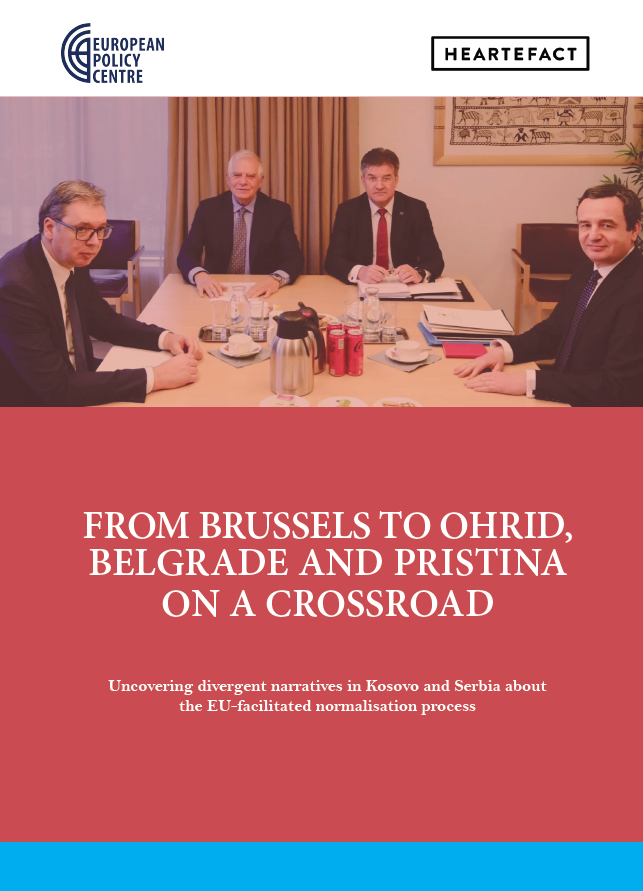Headquarters: Svetog Nauma 7, 11000
Office address: Đorđa Vajferta 13, 11000
Phone:: +381 11 4529 323
Chinese Influence in the Eastern Trio and the Western Balkans: Strategic Fragmentation in the EU’s Enlargement Countries China’s growing presence in Eastern and Southeastern Europe has become a source of strategic concern for the EU, especially as global power dynamics shift under the weight of increasing U.S.-China rivalry. Once seen primarily as an economic partner, China is now viewed by many in Europe as a systemic rival, particularly due to its trade practices, ambiguous geopolitical positions – such as its stance on Russia’s invasion of Ukraine – and its model of state-led development. Against this backdrop, the report examines China’s influence in nine EU (potential) candidate countries: the Eastern Trio (Georgia, Moldova, Ukraine) and the Western Balkans (Albania, Bosnia and Herzegovina, Kosovo, Montenegro, North Macedonia, Serbia), assessing the scope and nature of Chinese involvement.
Drawing on the InvigoratEU External Influence Index – an empirically grounded tool for systematically measuring and comparing the political, economic, and societal dimensions of external influence – the report tracks the evolution of China’s presence between 2013 and 2023. The findings show that China’s approach is flexible, pragmatic, and highly con-text-specific, rather than driven by a unified regional strategy. It leverages bilateralism, exploiting institutional fragmentation and offering alternatives to the EU’s liberal-demo-cratic model through infrastructure investments, soft power, and diplomatic engagement, often in ways that align with the interests of local elites.
Serbia emerges as China’s most deeply embedded partner, showing significant political alignment, high levels of economic engagement – including strategic FDI and a free trade agreement – and a growing societal footprint. In contrast, countries like Kosovo and Moldova exhibit minimal Chinese presence, largely due to non-recognition in the case of Kosovo and a sharp political and institutional reorientation toward the EU in Moldova. Georgia and Ukraine present complex cases: both show increasing political and economic influence by China, but with varying degrees of political openness and strategic caution. Among the Western Balkans, Albania and North Macedonia maintain limited but pragmatic relations with China, focusing primarily on trade and infrastructure, while Bosnia and Herzegovina and Montenegro have shown higher levels of economic engagement, often accompanied by governance and debt-related concerns.
On the economic front, Chinese engagement increased after the 2008 financial crisis and the launch of the Belt and Road Initiative in 2013. However, one of the report’s main findings is that China’s actual economic influence in the two regions remains limited and highly uneven. Meaningful economic presence is largely concentrated in a few countries such as Serbia (and Georgia and Ukraine to a lesser extent), while in most other countries it is marginal or symbolic. Despite high-profile announcements and investment promises, economic cooperation remains limited. This weak economic footprint undermines China’s ability to leverage economic engagement into long-term strategic influence. At the same time, concerns persist regarding issues such as debt sustainability, corruption risks, and the involvement of Chinese actors in sensitive sectors, including telecommunications.
In societal terms, China’s approach has been primarily top-down, driven by Confucius Insti-tutes, educational exchanges, and symbolic partnerships rather than bottom-up societal engagement. In terms of public perception, though, attitudes towards China are generally tepid to positive in most countries, especially where economic cooperation has been more visible. However, trust in China has significantly deteriorated in Ukraine, largely due to its perceived ambiguity regarding Russia’s invasion.
Overall, Chinese influence in the region is growing but remains fragmented. It tends to concentrate in environments where governance is weak, institutions are fragile, and EU prospects are either uncertain or distant. China acts less as a direct challenger to Brussels or Washington and more as a strategic opportunist – offering investment and diplomatic support without requiring democratic reform. This approach allows Beijing to reinforce the power of domestic elites in hybrid regimes while promoting its own development model.
To effectively respond to these challenges, the report recommends that the EU adopts a more strategic, targeted, and country-specific approach. The EU should strengthen political engagement beyond enlargement rhetoric through concrete diplomatic, institutional, and financial commitments tailored to the individual needs and contexts of partner coun-tries. Enhancing internal coherence and strategic coordination among EU member states and institutions is crucial to align policies on China-related issues and integrate them into broader enlargement strategies. Moreover, the EU should strengthen its support for transparency and resilience in partner countries by promoting anti-corruption measures, independent media, and the vibrant civil society, thereby reducing the attractiveness of opaque and conditional Chinese offers.


